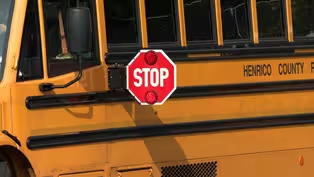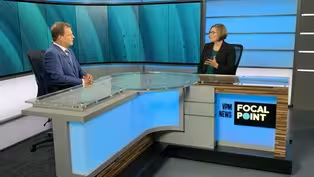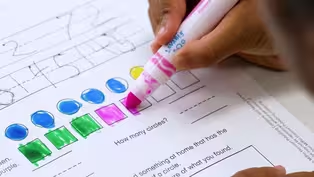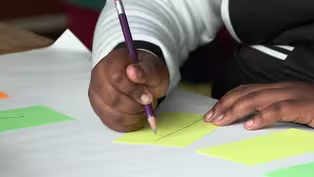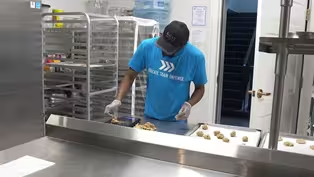VPM News Focal Point
Crisis in Education | September 7, 2023
Season 2 Episode 11 | 26m 46sVideo has Closed Captions
Pressing issues in Virginia’s education system.
Teachers, students and administrators address pressing issues in Virginia’s education system: academic learning loss, teacher attrition, and tensions over politics in the classroom. We also visit a bakery that’s staffed by students with disabilities.
Problems playing video? | Closed Captioning Feedback
Problems playing video? | Closed Captioning Feedback
VPM News Focal Point is a local public television program presented by VPM
VPM News Focal Point
Crisis in Education | September 7, 2023
Season 2 Episode 11 | 26m 46sVideo has Closed Captions
Teachers, students and administrators address pressing issues in Virginia’s education system: academic learning loss, teacher attrition, and tensions over politics in the classroom. We also visit a bakery that’s staffed by students with disabilities.
Problems playing video? | Closed Captioning Feedback
How to Watch VPM News Focal Point
VPM News Focal Point is available to stream on pbs.org and the free PBS App, available on iPhone, Apple TV, Android TV, Android smartphones, Amazon Fire TV, Amazon Fire Tablet, Roku, Samsung Smart TV, and Vizio.
Providing Support for PBS.org
Learn Moreabout PBS online sponsorshipBILLY SHIELDS: Many say a good education is key to success, but schools and students are struggling to catch up since COVID.
Coming up, we'll examine why so many teachers are quitting their jobs, explore the impact of the pandemic on learning loss, and hear about creative options for students with developmental disabilities.
You're watching VPM News Focal Point.
Production funding for VPM News Focal Point is provided by The estate of Mrs. Ann Lee Saunders Brown.
And by... ♪ ♪ BILLY SHIELDS: Welcome to VPM News Focal Point.
I'm Billy Shields in for Angie Miles.
The crisis in our education system persists.
In 2022, the Virginia Standards of Learning test scores declined in both reading and math for students across the state, showing a 16% drop in math and a 5% dip in reading comprehension compared to scores from 2019.
While the COVID pandemic highlighted where the cracks are, now communities are navigating how to teach and learn post pandemic.
Multimedia journalist, Keyris Manzanares, has more.
KEYRIS MANZANARES: Students and teachers alike are facing a variety of roadblocks heading into the new school year including educational inequity, teacher shortages, and mental health challenges.
RYAN JAMES: 2020 was great until it wasn't, and COVID, it really did affect.
Virtual learning was rough, there was a lot of inequities, a lot of inequalities that were very visible and prevalent.
KEYRIS MANZANARES: Ryan James, who's been a teacher for 12 years and currently teaches at Lucille Brown Middle School in Richmond, says students face inequities depending on their zip code.
RYAN JAMES: When you look at certain counties, there are a lot of resources that certain counties get versus other districts.
Whether you're talking about resources as in, you know, laptops and technology, or you're talking about resources as in new buildings and infrastructure.
KEYRIS MANZANARES: The quality of education in our state is also impacted by the shortage of teachers.
A report from the Virginia Department of Education shows that during the 2022/2023 school year there were nearly 3,600 teacher vacancies.
James Fedderman with the Virginia Education Association says educators are fed up and grossly underpaid.
JAMES FEDDERMAN: So we're talking about educators who are bringing home a paycheck that has no money, so it's essentially a stub.
Because they're having to use all of their money to pay for insurance, the cost of living, and not to mention the amount of money that educators are taking from their own paycheck to provide for school supplies.
KEYRIS MANZANARES: Another pressing concern is student mental health.
J.R. Tucker High School counselor Jackie Smith says they've seen an increase in anxiety and depression.
Social media has also changed the way students communicate.
JACKIE SMITH: Kids really are lacking language, and we know language is really important.
Having words is so important for you to express yourself and for you to be understood and to feel understood.
KEYRIS MANZANARES: As the new school year gets underway, Smith says addressing these challenges is instrumental to quality learning.
JACKIE SMITH: I am really hopeful about this school year.
I feel like kids are kind of getting back into a groove.
We are still addressing learning loss, we are still addressing mental health.
KEYRIS MANZANARES: For VPM News, I'm Keyris Manzanares.
BILLY SHIELDS: The Henrico County Public School system continues to grow its resources to meet student mental health care needs.
This year, Smith says, they're committed to redoubling efforts to implement new processes and intervention strategies.
BILLY SHIELDS: As our state confronts the many issues facing public education, we asked people of Virginia their points of view about what is most challenging in education today.
BRIAN SCHWAB: To keep quality teachers, we have to be able to pay them, and unfortunately, the pay scale for most teachers is inadequate.
And that's exactly why I left is I found better pay on the outside.
HAILE MOKRZYCKI: The money that you're putting into education, I mean, having the money first off is very vital, and just making sure people have a good foundation for real life careers.
CANDICE GRAHAM: Social part of it, you know, the transgender, the things like that, kids being themselves and not being pressured to be in one category or the other.
ROMELLA FERGUSON-SNEDEKER: think the problem is school shootings right now.
Kids have to go to school and they have to worry about like stuff like that and we just, we shouldn't even have to worry about that since we're still kids.
BRUCE LEE: Theres been a lot of controversy about a lot of teaching in history and I think that the more history that we learn about ourselves in a very truthful way would be a very beneficial thing to all of us.
Doesnt matter what color we are or what nationality we are we all have historical things and we all need to learn about each other.
BILLY SHIELDS: And as if the content and themes presented in the classroom are not enough of a concern, there's the issue of schools trying to hold onto those who present that information.
Increasingly, educators are having to do more with less.
We spoke with former public school teachers who shared their stories.
GILBERT HALL: I had made the decision first.
BILLY SHIELDS: Meet the Halls, Gilbert and Tedra.
Over most of the past decade, what brought both of them joy was teaching in public schools in the greater Richmond area.
TEDRA HALL: Every day was interesting.
They, a lot of my students were quirky like me and so that was always really fun.
We could just be weird together.
GILBERT HALL: When I was in high school, I had two really great history teachers, both my AP European history teacher and my AP US history teacher who really challenged me to go above and beyond what I was capable of.
BILLY SHIELDS: Teaching school has long been a tough, but rewarding job but teacher attrition is now a growing concern in Virginia classrooms.
The Halls both left the profession about a year ago, each for different reasons.
GILBERT HALL: Things just got in the way of it, in many ways is the simplest way to put it.
Just so many other things with school that started to make that job difficult and that role difficult.
BILLY SHIELDS: In Tedra's case, she obtained a promotion to a role as an innovative learning coach, a grant funded role in schools involving problem solving in technology.
TEDRA HALL: So, I received the promotion to be an ILC and then two weeks before school started, I got a phone call saying that there was a teacher shortage and I was needed in to teach second grade.
BILLY SHIELDS: With no experience in elementary ed, she was told she would have to teach second grade in two weeks.
TEDRA HALL: I resigned actually.
It broke my heart to do so.
There was no adjustment on what I would be able to do but that was the only offer that I had was to take that.
BILLY SHIELDS: Doing more with fewer resources, learning loss brought on by the pandemic, deteriorating morale.
It's all a familiar refrain to Jesse Senechal of VCU's Department of Education.
He also heads up a public school partnership called the Metropolitan Educational Research Consortium.
JESSE SENECHAL: I think if you look at the reasons that teachers leave, I think it often relates to the burden and workload.
There's too much.
BILLY SHIELDS: And for a teacher in Virginia schools, especially, Senechal says, salaries are an issue.
According to the National Education Association, Virginia ranks 22nd in the country in average teacher pay.
JESSE SENECHAL: Compensation's part of it, a lot of teachers leave because they just can't afford to be teachers anymore.
BILLY SHIELDS: Senechal would know, (bus brakes) he taught at Armstrong High after moving back here from Chicago.
His salary was about $20,000 less in Virginia.
JESSE SENECHAL: I took a tremendous pay cut and that was one of the reasons for getting out of the teaching profession.
It was like, ‘I got a kid, I've got another kid coming, I need to figure out, and my wife was a teacher too.
She moved, she was teaching at Henrico Public Schools and we both said we need to get other careers.
BILLY SHIELDS: Another factor he points to in the public school system is increasing focus on standards of learning and standardized tests at a time when the pandemic pushed so many kids to the back of the class.
JESSE SENECHAL: And the fact that so many of their students are coming in very far below level and the curriculum has not been adapted for that.
And so there's a real gap between where the students are, what the curriculum's telling them to do, and it almost creates an untenable situation where they're being really pushed.
You got to get these kids up to level.
We got to raise our reading scores, we've got to do this.
So there's a lot of pressure around like higher academic achievement.
BILLY SHIELDS: Back to the Halls, Gilbert now works in tech.
GILBERT HALL: I have recently moved to a software support role, actually, I took some of my interest and love for IT and information technology and I've now moved to a more supportive role in that respect in the private sector.
BILLY SHIELDS: Tedra works in insurance.
TEDRA HALL: Teacher skills are super transferrable.
BILLY SHIELDS: When they think about what it was like to put their heart into the classroom, both of them say they now have time to enjoy weekends, evenings, and holidays but there's a certain connection they miss.
BILLY SHIELDS: What do you miss?
TEDRA HALL: The kids.
I still go to events that I'm invited to.
I still try to keep up with them.
BILLY SHIELDS: For the Halls, it's time for supper, a meal that they now enjoy and plan much more often than when they were writing lesson plans.
On this night, Gilbert's cooking orange chicken.
BILLY SHIELDS: While the career changes have worked out for these teachers, their absence has left a void in the classroom.
According to Professor Senechal, the supply of trained teachers coming out of universities is at its lowest point now since the 1970s.
He notes however that there's one sign of hope, these trends tend to be cyclical.
ANGIE MILES: VPM News Focal Point is interested in the points of view of Virginians.
To hear more from your Virginia neighbors, and to share your own thoughts and story ideas, find us online at vpm.org/focalpoint.
BILLY SHIELDS: The pandemic exacted a heavy toll on student learning across Virginia.
That's apparent when you examine standardized test scores.
In the most recent national assessment of educational progress, Virginia saw some of the worst declines in the country in both reading and math.
The state has responded by making money available for college students to tutor younger students and for parents to find tutors.
So far, the need has outpaced the money.
Since the start of the pandemic, some of the help in combatting learning loss has been coming from unexpected places, and some of the needs go beyond reading, writing, and arithmetic.
DELORES SPENCER: How has your summer been?
- [Student] It's been going good.
DELORES SPENCER: We had said we're gonna, be tutoring again.
ANGIE MILES: Braden is a rising eighth grade student who lives in Texas.
The tutor, who's helping him make progress in his math studies, lives in Virginia.
DELORES SPENCER: But because it's an equation, you have to subtract six from both sides, okay?
Well, I just love math, and I want everybody to love it.
And I want you to be able to do it and to understand it.
ANGIE MILES: Dolores Spencer retired from Newport News Public Schools in 1991.
When the pandemic struck, Mrs. Spencer says she was immediately concerned about student learning loss, so she picked up the virtual chalk.
DELORES SPENCER: Good evening, and welcome to Mrs. Spencer's Math Lab.
ANGIE MILES: Going live on Facebook each week for nearly two years.
DELORES SPENCER: I was 88 years old in 2020 when I started Mrs. Spencer's Math Lab.
ANGIE MILES: She helped all kinds of learners make up lost ground or become more math savvy.
DELORES SPENCER: It was a few at first, but then more people began to listen.
And there were parents, there were people who just wanted to review math.
There were teachers, there were homeschoolers, and there were students.
ANGIE MILES: Within a short time, Mrs. Spencer had more than 1,000 students watching weekly as she demonstrated her math mastery and tailored her lessons to match students and parents requests.
DELORES SPENCER: I had students watching from all the states basically, and some from overseas.
It was far-reaching, much farther-reaching than any book would ever have been.
So that was a blessing that I was able to touch that many people.
ANGIE MILES: Mrs. Spencer is still getting requests for tutoring, and she says on her last birthday, she had more than 60,000 good wishes from fans around the globe.
And she says the crisis created by the pandemic created a space for her to inspire others to better understand and appreciate math in a way they might not have otherwise.
Elsewhere in Hampton Roads, there is a focus on learning loss that is just as urgent, but which extends beyond academics.
Students from Norfolk State University have been working with high school students on their classwork, but also on self-awareness and character building to strengthen them in their role as learners.
Here we look in on a session of the Picture Your Purpose program.
JOHN STEAN: Take all the different pieces and put them together into one thing that makes sense.
Does this line up with where I ultimately wanna be?
It's a partnership between the Urban League of Hampton Roads, Norfolk State University, and Next Step to Success.
We have an overarching program called the Tutoring and Mentoring Initiative that runs during the school year.
ANGIE MILES: What you're seeing is one example of a state-supported local initiative.
The Youngkin administration earmarked funds to support students at historically Black colleges and universities, HBCUs, as they support K-12 students in the aftermath of the pandemic.
This program is administered through the Urban League.
JOHN STEAN: While many of the factors responding to learning loss are based on standardized test scores and other very tangible metrics, some of the causes can be a little more difficult to identify.
I think much of it has to do with the disconnect that students feel from their peers, from their academic careers, from their hopes for the future.
ANGIE MILES: So here, they're focusing on the essential power of connecting or reconnecting.
ANIYA DOSS: Trying to get them to adapt to different environments other than being face-to-face on a computer and not interacting with other humans.
So in that classroom setting, they're able to interact with their peers, their classmates, their teachers knowing how to adapt to different people and different climates in the classroom.
LAFAYETTE ROBINSON: I'm more of a mentor over at University of Norfolk State.
And so for me, basically, it's really checking in on my peers, checking in on other members and their mental health, and any way I could help them.
JOHN STEAN: Most of our tutoring program takes place during the school year.
We support students in their core academic subjects, and we're doing that in a number of different school divisions in the area.
ANGIE MILES: Similar work is happening throughout the state under the direction of other area Urban Leagues.
WOMAN: Thank you.
ANGIE MILES: In Page County, students have been connecting with one another and with the greater community to support education.
This determined group of volunteers is connected through the West Luray Rec Center.
Center founder and driving force Audre King has a lot to say about repairing post-pandemic.
At The REC, that means mental health, physical well-being, social support, and most certainly, tutoring services.
AUDRE KING: What's after H?
Tutoring was a big undertaking, and one that when we began, we were not expecting to have.
Once the pandemic hit and the Honor Society students started coming in two, three days a week to tutor, that's when we really saw a difference and an impact on the students that we had here.
90% of the children that we serve, they come from backgrounds of rather poverty, addiction, have experienced domestic violence.
And so what we try to do is meet all of those needs.
ANGIE MILES: Page County, like every county in Virginia is relying on as many helping hands and hearts as possible.
School Superintendent Antonia Fox says they are effective here when they function like family.
ANTONIA FOX: So, we're pretty fortunate.
We have a variety of different groups that are committed to the schools and helping grow the community.
So, one is the rec center.
So many of our kids will go there after school.
And they're given food and meals.
They're given counseling, in some cases, group activities, tutoring, assistance with a variety of different things.
So that's a great place for kids to go.
ANGIE MILES: And within the division, she says there is a personal dedication to student learning.
She says many of these educators grew up attending these schools, and that they are recovering from the pandemic in a unified way.
ANTONIA FOX: I think people are beginning to feel a sense of normalcy.
It's different than it was before, but we've kept our doors open, and we've expanded opportunities for kids in terms of clubs and activities.
We're providing more after- school programs and services.
If a child needs help with reading, we're finding ways to get them that help, whether it's during the school day or after.
ANGIE MILES: Fox says that while test scores are an important indicator of how well her division and others are dealing with learning loss, she says scores don't tell the whole story of what's happening within a community.
Whether the answers come from individuals community organizations, institutions of higher learning, or from within the school divisions themselves, Virginia's test scores clearly show there is work to do when it comes to helping learners recover from what they lost during the pandemic.
Based on the efforts already underway, it seems one important message is that the opportunities to support students in getting back on track extend far beyond their classroom teachers and well beyond core academics.
BILLY SHIELDS: At last check, the state was working through problems with the accelerate learning grant program and seeking additional funding to assist more families.
Virginia also implemented the Bridging the Gap pilot program to partner with dozens of school divisions.
The initiative enlists help from a third party vendor to analyze individual student data to pinpoint learning opportunities.
BILLY SHIELDS: While students are struggling to keep up socially and academically, educators are seeking new ways to support them.
University of Virginia Professor of Education and Public Policy Beth Schueler is with us now to talk about solutions.
VPM is working on a reading campaign with the University of Virginia Literacy Partnerships.
That collaboration had no bearing on the content of this interview.
What kind of learning loss did we see in Virginia as a result of the pandemic?
BETH SCHUELER: What we saw, looking at sort of test score outcomes for grades three through eight that tested grades on the kind of SOL exams that parents will be familiar with, was a pretty sharp decline in math achievement in that first post-pandemic year.
The decline was, you know, larger than changes we saw in any of the pre-pandemic years and was also larger than was observed in a number of other states around the country.
BILLY SHIELDS: So who was the most impacted, and did COVID exacerbate the achievement gap?
BETH SCHUELER: We find that those test score declines were larger for economically disadvantaged students than economically advantaged students.
Larger for Black and Hispanic students than students of other races and ethnicities, and also larger for English learners than non-English learners.
BILLY SHIELDS: And what are the best solutions for kids that are having a hard time catching up?
Why is one-on-one tutoring so effective?
BETH SCHUELER: It's hard for me to think of another educational intervention that is backed by as large a body of evidence and as kind of high quality and rigorous a research base as high-dosage tutoring in particular.
In part, that has to do with the sort of low tutor-to-student ratio allows for educators to really diagnose challenges more effectively and tailor their supports to individual student needs, and it also, I think, has to do with the potential for relationship building, right?
BILLY SHIELDS: What do you tell parents who say they're not able to shoulder these extra educational costs themselves?
BETH SCHUELER: There may be opportunities I would ask your teacher and administrator.
I know the state of Virginia is also providing some grants directly to families who qualify based on income for these kinds of services.
However, the sort of federal pandemic relief funding is kind of coming to a close and is kind of running out at the moment, and so I think this is going to be a big challenge going forward to try to fund some of these programs.
(upbeat music) ANGIE MILES: You can watch the full interview on our website.
BILLY SHIELDS: Finding a job after high school can be especially challenging for those with disabilities.
One Richmond area bakery has found a recipe for success.
It offers an internship program with academic classes and training in the culinary arts for young people with developmental disabilities.
Senior producer Roberta Oster introduces us to a young man named Kemani who has found his dream job.
KEMANI TURTON-JONES: Welcome to Tablespoons!
How can we help you today?
CUSTOMER: Hi.
KEMANI TURTON-JONES: We have some Shark Week cookies.
CUSTOMER: Let's try one of those.
KEMANI TURTON-JONES: What else do you have in mind?
CUSTOMER: A banana muffin.
KEMANI TURTON-JONES:You got it, pal.
ELIZABETH REDFORD: Kemani is a baker.
KEMANI TURTON-JONES: Banana muffin.
ELIZABETH REDFORD: That is his title with us.
He works, though, in the kitchen, as well as in sales.
KEMANI TURTON-JONES: You got it.
ELIZABETH REDFORD: My name is Elizabeth Redford.
I'm the founder of Tablespoons Bakery.
I am a former classroom special educator.
What we get to do every day that's a little bit different, is do hands-on job training and related social skills out in the community for young adults with developmental disabilities.
KEMANI TURTON-JONES: As you can see, this is where the magic happens.
This is where customers come and buy some cookies.
This is the dining room.
CUSTOMER: Yeah, I can see that.
KEMANI TURTON-JONES: Where customers come in and dine in with one of our baked goods.
ELIZABETH REDFORD: Tablespoons, I like to say, is almost like a satellite public high school.
The curriculum model I've created, and it's been endorsed and approved by the Virginia Department of Education.
So when young adults who are in high school from area school systems join us during their school day, they are spending half of their time in a dedicated classroom site with us.
KEMANI TURTON-JONES: Here it goes.
ELIZABETH REDFORD: And then they spend the other part of their time with us out at a job site within the bakery.
We've also been able to become a supported employment site and hire some of our young adults.
KEMANI TURTON-JONES: This is our oven where we bake some delicious baked goods.
And this part over there, right next to it, is where we wash our hands right after we get started with what we're going to bake today.
ELIZABETH REDFORD: Kemani came through our program in 2018.
He is somebody who loves all things food and beverage.
KEMANI TURTON-JONES: Then I add some sugars into a big bowl.
ELIZABETH REDFORD: He very quickly became our top salesperson.
KEMANI TURTON-JONES: And then I like to measure it on the scale, just to be precise.
ELIZABETH REDFORD: I think that so often, people have never really thought about the disability community, what happens to young adults when they graduate from high school.
KEMANI TURTON-JONES: Oh, we just did a test bake on the churro cookies.
ELIZABETH REDFORD: We know that there's a great cliff.
We know that there are staggering unemployment rates.
Unfortunately, there is a 70% unemployment rate for young adults with developmental disabilities here in the State of Virginia, and that rate is actually at 80% nationally.
So the work that we are doing is really trying to directly combat that.
We're really tackling this as being able to bridge both the school setting, as well as the business setting together and provide that hands-on job training along with very intentional educational offerings.
But what we don't always talk about are the benefits of hiring from this community, that it is not charity, that these individuals stay in jobs longer.
There's less turnover rate, there's less absenteeism, and there's so much joy and enthusiasm that they inject into the culture of a business.
We are better for having Kemani be a part of our team.
KEMANI TURTON-JONES: I'll do the one with the cinnamon sugar, while you try the one without it, and we'll see which one we like best.
ELIZABETH REDFORD: And part of his role with us as a graduate that we've hired, is that he now gets to help us train incoming groups of students.
KEMANI TURTON-JONES: This is our Hall of Fame.
This is Haley.
This is Chris.
This is Cheyenne.
This is Elizabeth.
This is Shelly.
And that's me right down there.
So I've been baking here.
It certainly means a lot since I've been working here for like five years.
It's like a gift, you know, working.
I think it says to me like, I'm a rock star and I'm always proud of what I do in the future.
BILLY SHIELDS: We've taken a look inside Virginia's classrooms at some of the struggles and also some solutions.
Learn more about the State's crisis in education by going to our website, vpm.org/focalpoint.
While there, you can watch an extended version of our interview with Beth Schueler and leave us your story ideas.
Thank you for joining us, we'll see you here next week.
Production funding for VPM News Focal Point is provided by The estate of Mrs. Ann Lee Saunders Brown.
And by... ♪ ♪
Back to school: Cracks in Virginia’s education system
Video has Closed Captions
Clip: S2 Ep11 | 2m 25s | The crisis in our education system is a concern as students head back to the classroom. (2m 25s)
Video has Closed Captions
Clip: S2 Ep11 | 5m 48s | Public Policy Assistant Professor Beth Schueler discusses learning loss in Virginia. (5m 48s)
Communities and educators address learning loss
Video has Closed Captions
Clip: S2 Ep11 | 7m 23s | Virginia’s recovery efforts extend beyond test scores for pandemic-related learning loss. (7m 23s)
Feeling burned out, many teachers are calling it quits
Video has Closed Captions
Clip: S2 Ep11 | 4m 18s | In this post-pandemic school year, teachers face burnout, low wages and staffing shortages (4m 18s)
Young people learn life and work skills in a bakery
Video has Closed Captions
Clip: S2 Ep11 | 3m 44s | Young people with developmental disabilities find a recipe for success in the kitchen. (3m 44s)
Providing Support for PBS.org
Learn Moreabout PBS online sponsorship
- News and Public Affairs

Top journalists deliver compelling original analysis of the hour's headlines.

- News and Public Affairs

FRONTLINE is investigative journalism that questions, explains and changes our world.












Support for PBS provided by:
VPM News Focal Point is a local public television program presented by VPM
